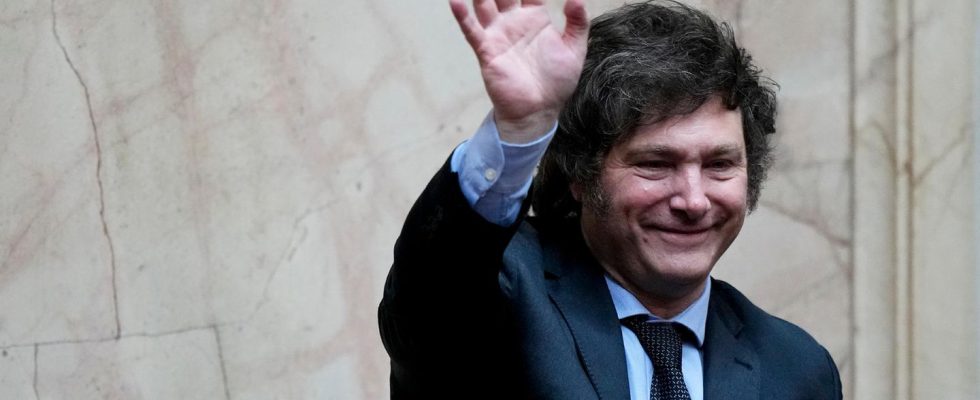After the election victory
Javier Milei takes off as Argentine president. This is what he plans to do with his country
Javier Milei is the elected president of Argentina
© Natacha Pisarenko / AP / DPA
The chainsaw-wielding eccentric Javier Milei moderated his stance surprisingly quickly after his election victory in Argentina. He backed away from his radical plans. How much of the promised 180-degree turnaround remains?
Voters’ frustration with the economic crisis that has been going on for years and their anger at the political establishment led the ultra-liberal economist Javier Milei to the highest state office Argentina, now the self-proclaimed “anarcho-capitalist” must prove that he is actually capable of steering South America’s second-largest economy into a better future. On Sunday he begins his four-year term as president.
During the election campaign, he thrilled his supporters with eccentric appearances and promised a radical new beginning: He wanted to introduce the US dollar as legal tender, abolish the central bank and many ministries and drastically cut social spending. But shortly after his victory in the runoff election three weeks ago, Milei clearly moderated his tone. “Many of the original plans have been postponed or weakened,” said Argentine economist Eduardo Levy Yeyati from the University of Torcuato Di Tella in the Americas Quarterly podcast.
Milei arrived in the political establishment surprisingly quickly. After the future president recently railed against the political “caste” he hates, he is now surprisingly pragmatic and is bringing experienced politicians into his cabinet. He nominated the former finance minister and central bank chief Luis Caputo as economics minister – a renowned financial expert who is well connected in international banking and Argentine politics. The conservative Patricia Bullrich, who was defeated by Milei in the election as the conservative candidate, is to become security minister again.
Biggest challenges after taking office
Milei takes over Argentina in a severe economic crisis. The inflation rate is over 140 percent, and around 40 percent of people in the once rich country live below the poverty line. One of the most important challenges is the fight against inflation and the budget deficit. Milei has already dampened expectations of a quick economic recovery. The economist even predicted a phase of stagflation at the start of his term. Economic activity stagnates or declines while prices continue to rise. “The reorganization of the budget will initially have a negative impact on the economy,” warned Milei. Inflation will also remain high for the time being. The future president announced that he would stop the expansion of the money supply in the next 18 to 24 months.
First steps of the new president in Argentina
According to media reports, immediately after taking office, Milei wants to introduce an extensive legislative package into parliament that is intended to fundamentally restructure the Argentine state. This includes a significant reduction in the number of ministries and authorities, the privatization of public companies and a significant reduction in bureaucracy to facilitate investments. “I don’t know how many laws we will repeal, but there will be a lot,” future Secretary of State Diana Mondino recently said on the radio. Since Milei does not have his own majority, he is already looking for allies in all political camps in order to get his ambitious legislative package through parliament.
Milei has apparently shelved one of his most important promises during the election campaign, the introduction of the US dollar as legal tender. In the past few weeks he hardly mentioned his former passion project anymore. “This is only realistic, because the country simply does not have enough foreign exchange to properly implement dollarization,” said economist Levy Yeyati.
Expected international U-turns
In contrast to the outgoing government, the ultra-liberal economist supports the controversial free trade agreement between the South American economic alliance Mercosur and the European Union. However, unlike his predecessor, he does not want to join the Brics confederation. Given his new pragmatism, it is rather questionable whether he will actually break with China and Brazil – Argentina’s most important trading partners – as announced during the election campaign. However, the position of the Argentine government regarding the wars in Ukraine and the Middle East is likely to change significantly: In contrast to the left-wing previous government, Milei is considered a determined supporter of Ukraine and Israel.

